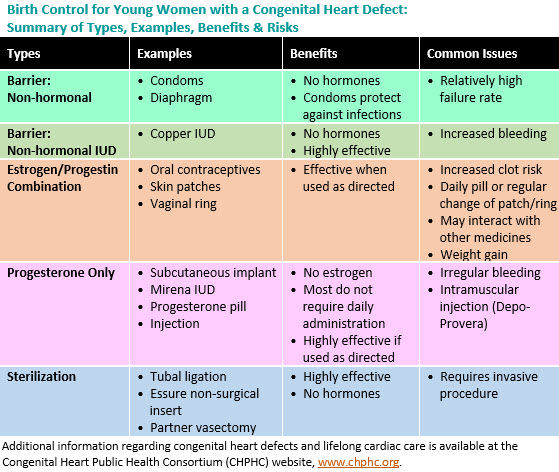Understanding the risks and benefits of different birth control methods is important for all women. For women with a congenital heart defect (CHD), choosing the right
birth control is critical to maintaining a healthy heart.
Questions to Ask Yourself:
Selecting birth control when you have a CHD requires you to think about all aspects of your life. Some typical questions might be:
Do I ever want to become pregnant? If so, when might that be?
Will pregnancy be too risky with my heart condition?
Web pages whose development was supported by federal government grants are being reviewed to comply with applicable Executive Orders.
Some women with a CHD have a very high risk for medical complications if they become pregnant. If this is you, it is important to use a very effective form of birth control or to consider permanent sterilization.
If pregnancy could be dangerous to your health but you would like to have a family, talk to your doctor about other options, such as adoption or surrogacy. Deciding not to have children is a perfectly acceptable option, too, if that is what you choose.
Types of Birth Control:
Women with a CHD who are able to have a safe or low risk pregnancy but are not ready to become pregnant yet have many options for birth control.
Some methods are more effective than others and some also last longer than others.
Some methods contain the hormones estrogen and/or progesterone (e.g. oral medications, skin patches, vaginal rings, implants).
Some forms of birth control use a "barrier" method to block sperm from entering the uterus (e.g. condoms, copper intrauterine devices or IUDs, diaphragms).
Benefits & Risks of Birth Control Methods:
There are different risks and success rates for the various forms of birth control.
Condoms have little physical risk to women. They are also highly effective at protecting against
sexually transmitted diseases. However, they do not always work well at preventing pregnancy. In fact, they have a failure rate as high as 30%.
Birth control pills are usually reliable at preventing pregnancy. However, some forms bith control pills contain estrogen which can increase the risk of stroke and other medical complications related to the increased risk of blood clots. Estrogen is not recommended if you have a CHD and are at increased risk of forming blood clots, especially if you have an artificial heart valve or have had a Fontan operation.
Progesterone-only birth control methods have a lower risk of blood clots. Progesterone can be taken as a pill, placed as an implant under the skin, given as monthly injections or used in an IUD. A progesterone pill must be taken at the same time every day. Progesterone forms of birth control are often good choices if you have a CHD. They can be highly effective when they are used the right way.
Progesterone IUD is a very effective method if you do not want to become pregnant for at least a few years.
Two forms of birth control are recommended if you are sure you never want to become pregnant or are at very high risk for a dangerous pregnancy. You may consider a tubal ligation or other permanent form of birth control, as well. If you have a long-term male partner, you may consider asking him to have a vasectomy.
Talk to your gynecologist about which form of birth control is best for you based on the recommendations of your congenital cardiologist.

Additional Information & Resources:
Additional information regarding congenital heart defects and lifelong cardiac care is available at the Congenital Heart Public Health Consortium (CHPHC) website, www.chphc.org. The CHPHC is housed at the American Academy of Pediatrics through a grant from the Centers for Disease Control and Prevention in an effort to utilize public health principles to affect change for those whose lives are impacted by a CHD. Organizational members of the Consortium represent the voice of providers, patients, families, clinicians and researchers.